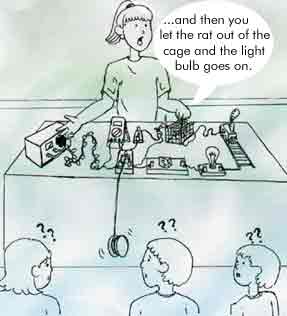|
home
|
notes
|
grade
|
print
|
| |
|
 Jen's hints:
Jen's hints:"Study for quizzes"2. Error analysis:
"Study the previous labs - know the calculations!"
"Make sure you actually study for quizzes. I mean really understand the labs before coming to lab. Quizzes can be tricky sometimes."
"Try to finish your [report] before the next time you meet in lab so you're ready for the quizzes."
"Study at least 10 min. for quizzes"
"Reread the previous lab handouts before coming to class"
"For quizzes, know how to do the previous labs calculation and know the procedure of the upcoming lab"
"Learn how to do error analysis"3. Miscellaneous:
"Read error analysis"
"Error analysis is important - write choke"
"Error Analysis is the key to survival so learn and understand it, especially uncertainties."
"Make sure you do you lab books on time"
"[The] most important thing is you have prepare[d] the lab before [you] come to class"
"Take advantage of the Java programs"
"Go to the TA's office hours to finish the lab if you're having trouble."
"Don't try to do the two lab reports over the weekend, you will easily get messed up"
"Always ask what you don't know in class"
"If you need to do graphical analysis, do this before you leave class"
"Ask which calculations and error things need to appear on the report"
"Write down the equations and graphs given during the prelab lecture"
"Try to read the lab and not[e]s before you start lab"
"Go to tutorial sessions if you have any questions. Never assume that you know the correct answers."